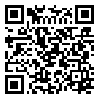Volume 79, Issue 9 (December 2021)
Tehran Univ Med J 2021, 79(9): 687-692 |
Back to browse issues page
Download citation:
BibTeX | RIS | EndNote | Medlars | ProCite | Reference Manager | RefWorks
Send citation to:



BibTeX | RIS | EndNote | Medlars | ProCite | Reference Manager | RefWorks
Send citation to:
Memari F, Emami Razavi S H, Kiani F, Khzaeipour Z. The effects of time management on improvement of educational and therapeutic services in surgical residents of Imam hospital.. Tehran Univ Med J 2021; 79 (9) :687-692
URL: http://tumj.tums.ac.ir/article-1-11435-en.html
URL: http://tumj.tums.ac.ir/article-1-11435-en.html
1- Department of Surgery, Imam Khomeini Complex Hospital, Tehran University of Medical Sciences, Tehran, Iran. , fe.memari@yahoo.com
2- Department of Surgery, Imam Khomeini Complex Hospital, Tehran University of Medical Sciences, Tehran, Iran.
3- Brain and Spinal Injury Research Center, Neuroscience Institute, Tehran University of Medical Sciences, Tehran, Iran.
2- Department of Surgery, Imam Khomeini Complex Hospital, Tehran University of Medical Sciences, Tehran, Iran.
3- Brain and Spinal Injury Research Center, Neuroscience Institute, Tehran University of Medical Sciences, Tehran, Iran.
Abstract: (1095 Views)
Background: Time management is effective in controlling stress especially for medical residents. Time management in the surgical field and residential education is very important as they are directly involved in treating patients. Proper time management will help decrease work-related stress and increase efficacy, although there is no time management in medical courses. There are few studies in Iran in this field. So, we designed this study to assess the effects of time management on improvement of educational and therapeutic services in surgical residents of Imam Hospital.
Methods: This before–after study was done in Imam hospital between February-March 2015. In this before-after study, 18 surgical residents of Imam Hospital (residents of 1-4 years), were enrolled. Their activities were evaluated in 11 scopes. To evaluate the effects of this self-evaluation, 5 scopes were assessed by the staff. The time during two weeks spent on each item was claimed as a percentage of 336 hours in two weeks. The self-assessment results and their effects on their scores were considered. Data regarding age, sex, and marital status were also gathered. Data were analyzed using SPSS software.
Methods: This before–after study was done in Imam hospital between February-March 2015. In this before-after study, 18 surgical residents of Imam Hospital (residents of 1-4 years), were enrolled. Their activities were evaluated in 11 scopes. To evaluate the effects of this self-evaluation, 5 scopes were assessed by the staff. The time during two weeks spent on each item was claimed as a percentage of 336 hours in two weeks. The self-assessment results and their effects on their scores were considered. Data regarding age, sex, and marital status were also gathered. Data were analyzed using SPSS software.
|
Results: Eighteen residents were enrolled in this study. Ten residents were male (55.6%) and eight were female. Six (33.3%) were married. The mean age was 30±3.7 years. Resting time and emergency room time were significantly higher in the first-year residents while studying time was higher in the fourth-year residents. Second-year residents spend more time in training classes than others. The mean score at the beginning and the end of the study was highest in the forth-year residents and lowest in the first-year residents. All scores at the end of the study were significantly higher than the beginning except clinical judgment. The increase of the mean overall score was significantly higher in the fourth-year group and lowest in the first-year group.
Conclusion: Time management could improve the educational performance of surgical residents. |
Type of Study: Original Article |
Send email to the article author
| Rights and permissions | |
 |
This work is licensed under a Creative Commons Attribution-NonCommercial 4.0 International License. |





